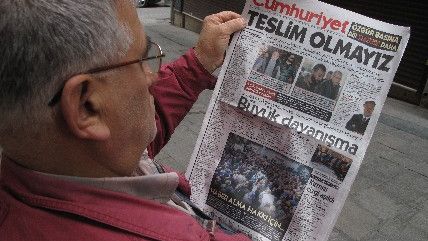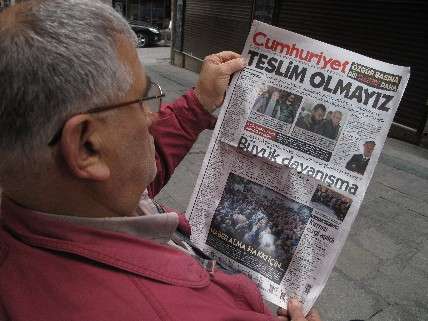Turkey's PM Rejects Europe's 'Red Line' On Freedom of the Press
Post-coup crackdown now hits one of Turkey's last remaining opposition news outlets.


Turkey's Prime Minister Binali Y?ld?r?m defended the arrest of at least 13 journalists and rejected the European Union's "red line" regarding freedom of the press, amid the latest Turkish government crackdown on anyone it deems a threat in the aftermath of last summer's failed coup attempt.
The secular and independent Cumhuriyet, one of the last "opposition" news outlets still technically allowed to operate in Turkey, was accused by the government of running "subliminal messages" to encourage the coup and/or attempting to legitimize it after the fact. The paper's editor-in-chief and "at least" 12 other staffers were arrested, according to Christian Science Monitor, and the Hurriyet Daily News reports the Cumhuriyet staffers (which in addition to journalists included a lawyer and a cartoonist) were charged with "committing crimes on behalf of" what the government describes as pro-Kurdish terror groups.
European Parliament President Martin Schulz sent the following tweets to express official opposition to the actions of the Turkish government (which continues to seek membership in the European Union):
The detention of Murat Sabuncu and other #Cumhuriyet journalists is yet another red-line crossed against freedom of expression in #Turkey
— Martin Schulz (@MartinSchulz) October 31, 2016
.@cumhuriyetgzt isn't just any other independent newspaper: it's the oldest secular newspaper in the country, an institution of the Republic
— Martin Schulz (@MartinSchulz) October 31, 2016
Prime Minister Yildrim responded to Schulz's comments in an address to his party in the Turkish parliament, saying, "Brother, we don't care about your red line. It's the people who draw the red line. What importance does your line have." Yildirim added, "Turkey is not a country to be brought in line with salvoes and threats. Turkey gets its power from the people and would be held accountable by the people."
According to Christian Science Monitor:
Since July, 170 media outlets have been shut down and 105 journalists arrested, according to the general secretary of the Turkish Journalists' Association. Additionally, more than 700 journalists have had their press credentials revoked.
"Instead of moves to strengthen democracy we are faced with a counter coup," main opposition party leader Kemal K?l?çdaro?lu said after visiting Cumhuriyet. "We are faced with a situation where the coup has been used as an opportunity to silence society's intellectuals and mount pressure on media."
The attempted coup, which lasted less than a day, has led to the arrest of almost 37,000 people and the removal of over 100,000 from their jobs in government. But the Turkish government's assaults on the free press and free speech long pre-date the coup.
In the past year, two Cumhuriyet journalists were arrested for republishing Charlie Hebdo cartoons depicting the prophet Muhammad, a Vice News reporter was imprisoned a Vice News reporter for 131 days, and the country's largest newspaper was seized by the government. Reports Without Borders has described Turkey "the world's biggest prison for journalists" and Columbia Journalism Review, called the country a "neo-authoritarian state."


Show Comments (70)